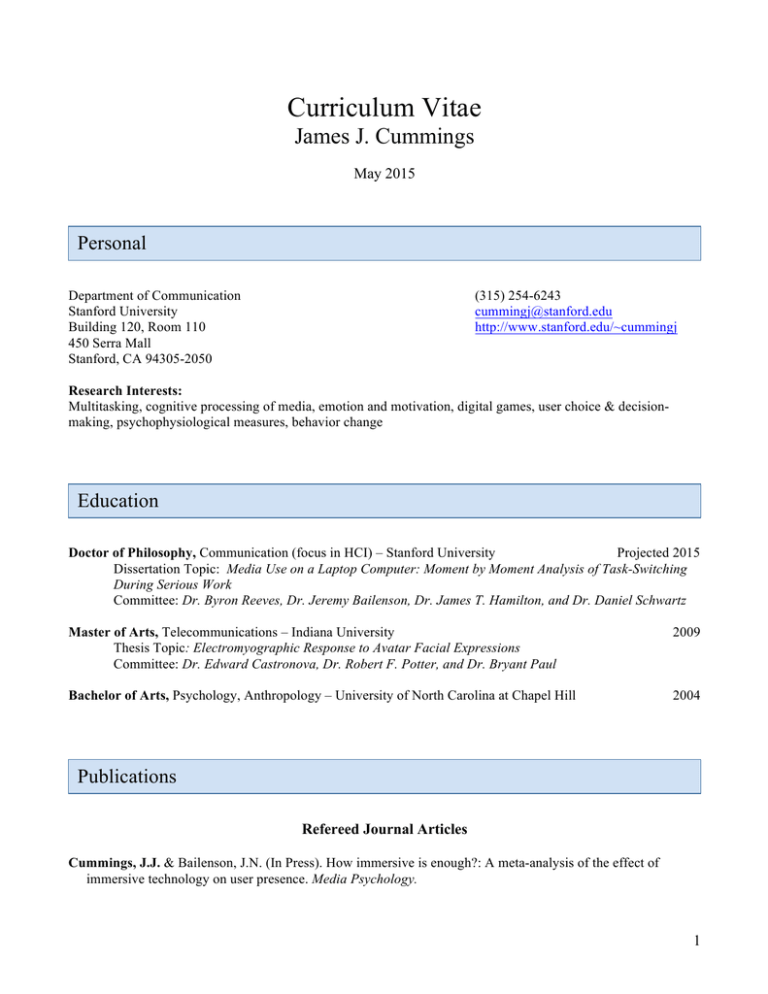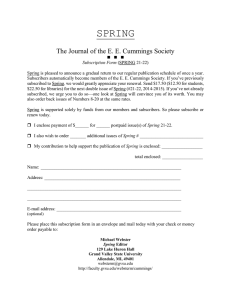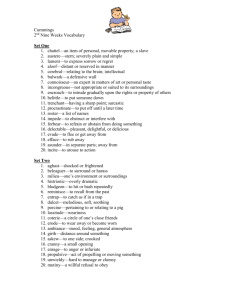Curriculum Vitae - Stanford University
advertisement

Curriculum Vitae James J. Cummings May 2015 Personal Department of Communication Stanford University Building 120, Room 110 450 Serra Mall Stanford, CA 94305-2050 (315) 254-6243 cummingj@stanford.edu http://www.stanford.edu/~cummingj Research Interests: Multitasking, cognitive processing of media, emotion and motivation, digital games, user choice & decisionmaking, psychophysiological measures, behavior change Education Doctor of Philosophy, Communication (focus in HCI) – Stanford University Projected 2015 Dissertation Topic: Media Use on a Laptop Computer: Moment by Moment Analysis of Task-Switching During Serious Work Committee: Dr. Byron Reeves, Dr. Jeremy Bailenson, Dr. James T. Hamilton, and Dr. Daniel Schwartz Master of Arts, Telecommunications – Indiana University Thesis Topic: Electromyographic Response to Avatar Facial Expressions Committee: Dr. Edward Castronova, Dr. Robert F. Potter, and Dr. Bryant Paul 2009 Bachelor of Arts, Psychology, Anthropology – University of North Carolina at Chapel Hill 2004 Publications Refereed Journal Articles Cummings, J.J. & Bailenson, J.N. (In Press). How immersive is enough?: A meta-analysis of the effect of immersive technology on user presence. Media Psychology. 1 Reeves, B., Yeykelis, L., & Cummings, J.J. (In Press). The use of media in media psychology. Media Psychology. Yeykelis, L., Cummings, J.J., & Reeves, B. (2014). Multitasking on a computer: Arousal and the frequency, anticipation, and prediction of task-switching. Journal of Communication, 64(1), 167-192. Reeves, B., Cummings, J.J., Scarborough, J.K., & Yeykelis, L. (2013). Increasing energy efficiency with entertainment media: An experimental and field test of the influence of a social game on performance of energy behaviors. Environment & Behavior. Cummings, J.J. & Ross, T. L. (2011). Optimizing the psychological benefits of choice: Information transparency & heuristic use in game environments. International Journal of Gaming and Computer-Mediated Simulations, 3(3), 19-33. Castronova, E., Bell, M.W., Carlton, M., Cornell, R., Cummings, J.J., Emigh, W., Falk, M., Fatten, M., LaFourest, P., Reynard, J., Robbins, S., Ross, T., Ryan, W., & Starks, R. (2009). A test of the law of demand in a virtual world: Exploring the Petri dish approach to social science. International Journal of Gaming and Computer-Mediated Simulations, 1(2), 1-16. Castronova, E., Cummings, J.J., Emigh, W., Fatten, M., Mishler, N., Ross, T., & Ryan, W. (2009). Case study: The economics of Arden. Special issue of Critical Studies in Media Communication, 26(2), 165-179. Revise and Resubmit Requests Reeves, B., Cummings, J.J., & Scarborough, J.K. (under review). Using games and virtual worlds to change the nature of work. Cummings, J.J. & Potter, R.F. (under review). Physiological and self-reported responses to dynamic emotional change in game avatars. Journal Manuscripts Under Preparation Cummings, J.J. & Yeykelis, L. From conventional to theoretically based definitions of media tasks and multitasking: A review of past literature and proposed guidelines for future research Book Chapters Castronova, E., Ross, T.L., Bell, M.W., Cummings, J.J., & Falk, M. (2011). A test of the law of demand in a virtual world: Exploring the Petri dish approach to social science. In R.E. Ferdig (Ed.), Discoveries in Gaming and Computer-Mediated Simulations: New Interdisciplinary Applications (pp.301-314). Hershey, PA: IGI Global. Castronova, E., Bell, M.W., Cornell, R., Cummings, J.J., Falk, M., Field, A., Robbins, S., & Ross, T. (2009). Synthetic worlds as experimental instruments. In M.J.P. Wolf & B. Perron (Eds.), The Video Game Theory Reader: Volume 2 (pp.273-294). New York: Routledge. 2 Castronova, E., Bell, M.W., Cummings, J.J., Emigh, W., Falk, M., Fatten, M., Mishler, N., Ross, T., & Ryan, W. (2009). Virtual world economies: A case study of the economics of Arden. In D. Heider (Ed.), Living Virtually: Researching New Worlds (pp.165-189). New York: Peter Lang Publishing, Inc. Castronova, E., Cummings, J.J., Emigh, W., Fatten, M., Mishler, N., Ross, T., & Ryan, W. (2007). What is a synthetic world? In. F. von Borries, S. Walz, and M. Böttger (Eds), Space Time Play: Computer Games, Architecture and Urbanism: The Next Level (pp. 174-181). Basel: Birkhäuser. Other Publications (Proceedings, Invited Papers, Refereed Abstracts) Cummings, J.J., Bailenson, J.N., & Fidler, M.J. (2012). How immersive is enough? A foundation for a metaanalysis of the effect of immersive technology on measured presence. Proceedings of the International Society for Presence Research Annual Conference. October 24-26, Philadelphia, Pennsylvania, USA. Reeves, B., Cummings, J.J., & Anderson, D. (2011). Leveraging the Engagement of Games to Change Energy Behavior. Proceedings of the ACM CHI Conference on Human Factors in Computing Systems, Gamification Workshop, May 7, Vancouver, BC, Canada. Reeves, B., Cummings, J.J., Scarborough, J., & Read, J.L. (2010). Government uses for games and virtual worlds: Optimizing choices for citizens and government workers in the areas of energy efficiency, educational assessment, work productivity, safety and health, and quality of information exchanges. White House Office of Science and Technology Policy’s Occasional Papers series. Cummings, J.J. & Potter, R.F. (2010, April). Physiological and self-reported responses to dynamic emotional change in actual computer game avatars. Clinical EEG and Neuroscience, 41(2), 105. Potter, R.F., Chung, H., Cummings, J.J. (2008, October). Response to music varies according to motivation activation. Psychophysiology,45(Supplement), S108. Castronova, E., Cummings, J.J., Emigh, W., Fatten, M., Mishler, N., & Starks, R. (2007). Synthetic worlds, real results. Harvard Interactive Media Review, 1(1). Presentations Refereed Conference Presentations Cummings, J.J., & Bailenson, J.N. (2015). How Immersive is Enough? A Meta-Analysis of the Effect of Immersive Technology on User Presence. Poster presented at the 65th Annual International Communication Association Conference (Information Systems Division), San Juan, Puerto Rico. Yeykelis, L., Cummings, J.J., & Reeves, B. (2015). The Effects of Media Multitasking on Emotion and Content Choice Over a Week of Laptop Use. Poster presented at the 65th Annual International Communication Association Conference (Information Systems Division), San Juan, Puerto Rico. 3 Cummings, J.J. (2014). Easy pickings: Using heuristics to optimize player choices & enjoyment. As part of “Psycho/biological considerations for human interactions within video games.” Panel conducted at 100th Annual National Communication Association Conference, Chicago, IL. With: Dr. Nicholas Bowman, Dr. Matthew Grizzard, Richard Huskey, Dr. Rene Weber, Teresa Lynch, and Nicholas Matthews. Yeykelis, L. Cummings, J.J., Lang, A., & Reeves, B. (2013). Investigating a novel measure of skin conductance for assessing cognitive involvement in media tasks. Paper presented at 53rd Annual Society for Psychophysiological Research Conference, Florence, Italy. Yeykelis, L., Cummings, J.J., & Reeves, B. (2013). Multitasking on a computer: Emotions and the frequency, anticipation, and prediction of task-switching. Paper presented at the 63rd Annual International Communication Association Conference (Information Systems Division), London, England. Ross, T. L. & Cummings, J.J. (2013). How much choice do gamers want? The effects of choice assortment and complexity on enjoyment, frustration, and regret. Poster presented at the 63rd Annual International Communication Association Conference (Games Studies Special Interest Group), London, England. Cummings, J.J. & Yeykelis, L. (2013). Dynamic regulation of player states through adaptive gaming: A motivated cognition approach. Paper presented at the 63rd Annual International Communication Association Conference (Game Studies SIG Pre-conference – “The Power of Play: Motivational Uses and Applications of Digital Games”), London, England. Reeves, B., Cummings, J.J., Scarborough, J.K., & Flora, J. (2013). How video games can change energy behavior and reduce consumption. Paper presented at the Garrison Institute Climate, Mind and Behavior Symposium. Garrison, NY. Cummings, J.J., Bailenson, J.N., & Fidler, M.J. (2012). How immersive is enough? A foundation for a metaanalysis of the effect of immersive technology on measured presence. Paper presented at the International Society for Presence Research Annual Conference, Philadelphia, PA. Reeves, B., Cummings, J.J., Scarborough, J.K., Flora, J., & Anderson, D. (2012). Can games change energy behavior and reduce consumption? Paper presented at the 2012 Behavior, Energy & Climate Change Conference, Sacramento, CA. Reeves, B., Cummings, J.J., Scarborough, J.K., Anderson, D., & Flora, J. (2012). Leveraging the engagement of games to change energy behavior. Paper presented at the 2012 International Conference on Collaboration Technologies and Systems, Denver, CO. Reeves, B., Cummings, J.J., & Anderson, D. (2011). Leveraging the engagement of games to change energy behavior. Paper presented at the ACM CHI Conference on Human Factors in Computing Systems (Gamification Workshop), Vancouver, BC, Canada. Cummings J.J. & Ross, T. L. (2010). Optimizing the psychological benefits of choice: Information transparency & heuristic use in game environments. Paper presented at the Meaningful Play Conference, Lansing, MI. Cummings, J.J. & Potter, R.F. (2009). Physiological and self-reported responses to dynamic emotional change in actual computer game avatars. Paper presented at the Australian Society for Psychophysiology Conference, Newcastle, New South Wales. 4 Cummings, J.J., Potter, R.F., & Chung, H. (2009). Smile and the virtual world smiles with you: Electromyographic responses to avatar facial expressions. Paper and poster presented at the 59th International Communication Association Conference (Information Systems Division), Chicago, IL. Potter, R.F., Chung, H., & Cummings, J.J. (2008). Response to music varies according to motivation activation. Paper presented at the 48th Annual Society for Psychophysiological Research Conference, Austin, TX. Castronova, E. & Cummings, J.J. (2007). Economics of Arden. Paper presented at the 93rd Annual National Communication Association Conference, Chicago, IL. Cummings, J.J. & Foels, R. (2003). Mate preferences and gender socialization: Evidence against simple evolutionary explanations. Paper presented at the Society of Southeastern Social Psychologists Conference. Greensboro, NC. Invited Presentations “Taking Games Seriously: Leveraging the Engagement of Games for Learning and Behavior Change.” (2014, August 21). Science and Technology Leadership Association, Educational Games Forum, Stanford University, Stanford, CA. “Leveraging the Engagement of Games to Change Energy Behavior.” (2013, January 29). CICERO Learning Stanford University Site Visit, Stanford, CA. “How Immersive is Enough? A Foundation for a Meta-Analysis of the Effect of Immersive Technology on Measured Presence.” (2012, October 11). Stanford Virtual Human Interaction Lab, Stanford, CA. “Leveraging the Engagement of Games to Change Energy Behavior.” (2011, November 21). Research Experience Program, Foothill College, Los Altos Hills, CA. “New Media and Energy Behavior: Using the Engagement of Games, Virtual Worlds and Social Networking to Change Energy Behavior.” (2011, November 3). U.S. Department of Energy ARPA-E Site Visit, Stanford, CA. “Arden: World of William Shakespeare.” (2007, May 23). MacArthur Foundation. Chicago, IL. “Synthetic Worlds: The Real World of Online Games.” (2007, May 10). HAVAS New Media – Logistics Research and Catalyst Global Meeting. Miami, FL. “Arden: World of William Shakespeare & the Multiverse Platform”. (2007, March 7-9). Game Developers Conference, Floor Demonstration. San Francisco, CA. “Arden: World of William Shakespeare.” (2006, November 3). Ball State University. Muncie, IN. 5 Research Appointments Graduate Research Assistant Stanford University P.I. Jeremy Bailenson 2014 Virtual Human Interaction Lab Immersion at Scale Project – large-scale national field study using commercial mobile systems to investigate the relative contribution of different immersive features to the ideal virtual experience. Graduate Research Assistant Stanford University P.I. Byron Reeves 2010-2013 U.S. Department of Energy ARPA-e Field and laboratory research investigating effect of embedding real world energy data into a social game experience. Graduate Research Assistant Indiana University P.I. Edward Castronova 2008-2009 Research and design for a browser-based virtual world for testing theories of macroeconomic development (Greenland: A Persistent Political Economy at the Dawn of the Iron Age). Graduate Research Assistant Indiana University P.I. Edward Castronova 2006-2007 MacArthur Foundation Design and production of a multiplayer online game for testing economic theory. (Arden: World of William Shakespeare). Teaching Experience Instructor Computers and Interfaces: Psychological and Social Issues Stanford University (Fall 2014) Created lectures, constructed exams, managed team of teaching assistants. Distinction of department appointing a graduate student as instructor of record for a major course during the regular academic session. Media Psychology Stanford University (Spring 2014) Created lectures, constructed exams, managed team of teaching assistants, lead in-class lab exercises. Distinction of department appointing a graduate student as instructor of record for a major course during the regular academic session. Fun & Games: Motivational Design of User Experiences Stanford University (Summer 2012) Created and taught a course for 30 students, comprised of Stanford undergraduate and graduate students as well as visiting students from various U.S. and international universities. Received 4.8/5.0 overall evaluation. 6 Teaching Assistant Media Technologies, People, and Society Stanford University (Fall 2013) Constructed exams, graded assignments, lead weekly discussion sections Media Psychology Stanford University (Spring 2013) Constructed exams, graded assignments, lead weekly in-class lab experiments Media Psychology Stanford University (Spring 2012) Revamped curriculum and course structure to include in-class media-based lab experiments and activities Communication Research Methods Stanford University (Winter 2011) Constructed exams, graded assignments, lead weekly discussion sections Electronic Media Sales Constructed exams, graded assignments Indiana University (Spring 2008) Living in the Information Age Indiana University (Fall 2007) Constructed exams, graded assignments, lead weekly discussion sections Invited Lectures Media Technologies, People, and Society Topic: Multitasking Stanford University (Fall 2013) Media Psychology Topic: A ‘Cognitive Teardown’ of Angry Birds Stanford University (Spring 2013) Media Psychology Topic: Information Processing: Schemas & Priming Stanford University (Spring 2012) Media Psychology Topic: Multitasking Stanford University (Spring 2012) Multiplayer Game Design Topic: Writing Lore & Backstory for Game Design Indiana University (Fall 2007) Grants, Awards, & Honors • • • • Ric Weiland Graduate Fellowship in the Humanities & Sciences (2012-2014) Top Paper Award. Meaningful Play Conference (2010) Academic Fellowship, Department of Communication, Stanford University (2009) Academic Merit Scholarship & Stipend, Department of Telecommunications, Indiana University – Bloomington (2006) 7 • • Carolina Entrepreneurial Initiative: Social Entrepreneurship, Second Place (2005) Psi Chi, National Honor Society in Psychology (2004) Professional Activity & Service Journal Reviewer Journal of Communication (2013) IEEE Transactions on Affective Computing (2013) Environment & Behavior (2013) Computer Methods and Programs in Biomedicine (2013) American Journal of Play (2008) Conference Reviewer International Communication Association – Information Systems Division (2008 – Present) International Communication Association – Games Studies SIG (2009 – Present) International Society for Presence Research (2013) Gamification 2013 (2013) Foundations of Digital Games (2012) Conference Programming Committee International Society for Presence Research (2013) Professional Affiliations Member, International Communication Association Member, National Communication Association Member, Society for Psychophysiological Research Technical Statistics – SPSS, R Web – HTML, CSS Python, Java Content Management – Drupal Research Software – Qualtrics, SurveyMonkey, Sona Systems, MediaLab 8


